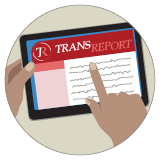 A recent study conducted by the Boston Region Metropolitan Planning Organization (MPO) found that a substantial number of Boston region workers reverse commute, but serving these trips by transit remains challenging because of entrenched land use patterns and the structure of transit, walking, and biking networks.Reverse commuters are residents of the core of a major urban area, such as Boston, who travel to and from work in the suburbs. In recent years, this phenomenon has become a major point of interest in media and public policy circles. The MPO study sought to better understand how many reverse-commute trips occur in the region so planners can develop strategies for improving these trips.
A recent study conducted by the Boston Region Metropolitan Planning Organization (MPO) found that a substantial number of Boston region workers reverse commute, but serving these trips by transit remains challenging because of entrenched land use patterns and the structure of transit, walking, and biking networks.Reverse commuters are residents of the core of a major urban area, such as Boston, who travel to and from work in the suburbs. In recent years, this phenomenon has become a major point of interest in media and public policy circles. The MPO study sought to better understand how many reverse-commute trips occur in the region so planners can develop strategies for improving these trips.
